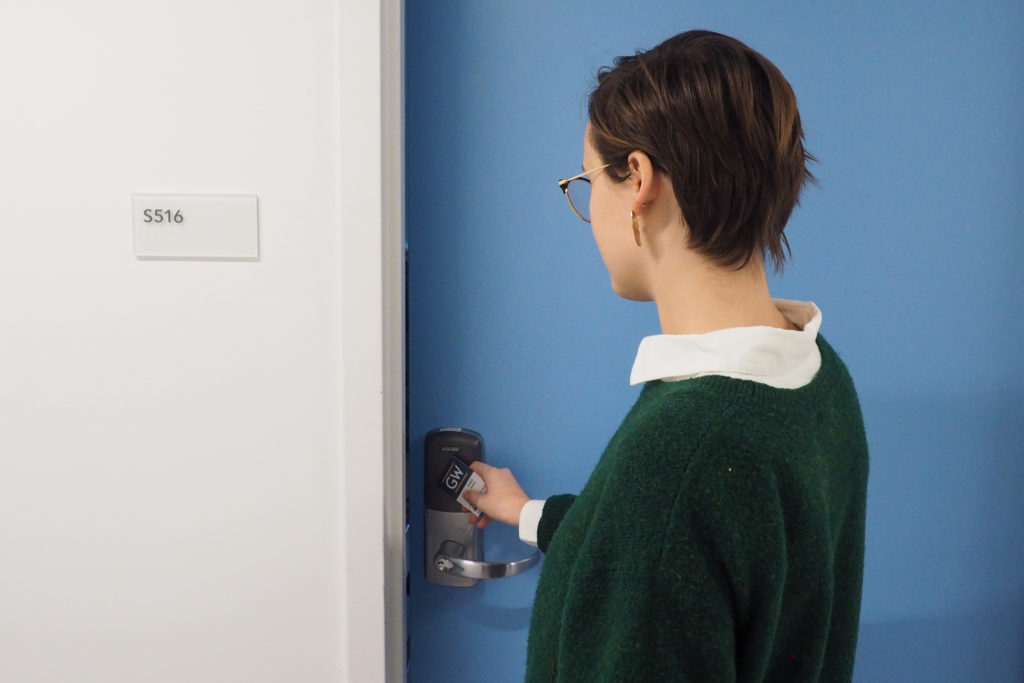Updated: Oct. 10, 2019 at 8:55 a.m.
Students living on the Foggy Bottom and Mount Vernon campuses will only need their GWorld card to access their residence hall rooms starting January, officials announced last week.
Associate Vice President of Safety and Security Scott Burnotes said about half of all residence halls are currently equipped with electronic locks on each door, and expanding the system to include all halls will equalize security. More than 10 students said using an electronic lock instead of a key would increase security because they could keep better track of their ID card than a physical key.
“Electronic access is proven to add security by reducing crime and the potential for unauthorized access due to an individual losing a key or accidentally leaving their room unlocked,” Burnotes said in an email. “Residential units with electronic access automatically lock when the door is closed.”
Officials will also add tap access to several large classrooms and auditoriums, like the Marvin and Academic centers, Burnotes said. He added that officials can immediately deactivate a GWorld card if a student loses their ID, eliminating the chance that anyone could access a student’s room while the student waits for a new card.
An unlawful entry in Fulbright Hall last month sparked safety concerns among the building’s residents, some of whom said they usually kept their doors unlocked so their friends have easy access to their rooms.
“The spaces chosen for the pilot program offer different scenarios and situations that will be a good representation of academic spaces across all campuses,” Burnotes said. “This allows us to create a plan that is scalable across the University.”
Amanda Plocharski, a Thurston Hall resident, said only needing her GWorld card to enter her residence hall room is more convenient than keeping track of a physical key because “I always have my GWorld on me.” She said the electronic lock adds an extra level of security to the tap access required to enter the building and the elevators.
“There is the safety of having to tap into the building itself and then tapping into the elevator or stairs so I think that’s safe either way,” Plocharski said.
Merry Jiang, a Fulbright Hall resident who uses a physical key to access her room, said having an electronic lock would increase her personal safety because she’d be less likely to lose track of her key.
“I don’t have to depend on my roommates and wait for them to come back,” Jiang said.
Paulina Mnev, a Lafayette Hall resident, said she and several residents in her hall have experienced malfunctions with the hall’s electronic keys. She said the batteries in the doors sometimes die, preventing her from accessing her room.
“Sometimes I have trouble unlocking it on the first try and I know some people have said that the system has died on them, and they had to call in to get someone to change the batteries,” she said.
Campus security experts said replacing physical locks with electronic access will prevent non-students from entering students’ rooms, which tightens overall campus security.
Michael Colegrove, the CEO and president of the security company Campus Safety Solutions, said many universities are switching to electronic locks rather than locks that need keys to boost safety.
“One of the benefits would be the whole situation with lost keys,” Colegrove said. “I know that on most campuses that’s an issue. And it’s not only an issue for those who have to provide the key, it’s an issue for students, because usually there’s a fee associated with it.”
He said instituting electronic access for each room is more secure than requiring a physical key because cards can be deactivated when they’re lost.
“Students should feel good about the fact that the University is giving attention to this type of thing and trying to make the campus as secure as possible,” Colegrove said.
Scott Lewis – a partner at TNG, a campus safety consulting firm – said adding tap access to academic buildings is common on urban campuses where relatively higher volumes of non-students can access school buildings. He said students should still prevent non-students from entering tap-monitored academic spaces.
“In so much as people still might let somebody piggyback in behind them, for example, that is why we’re relying on the community to be vigilant,” Lewis said.
This post has been updated to reflect the following correction:
The headline and lede of this story have been changed to reflect that tap access changes will go into effect by next calendar year, not December. We regret this error.




